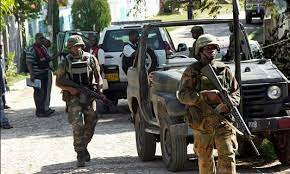Opposition senators on Friday dealt a major blow to the Government’s main crime-fighting tool when all eight of them voted against extending the states of emergency (SOEs) that were declared for seven parishes by Prime Minister Andrew Holness on November 15.
The vote, at approximately 5pm, came after several hours of sometimes heated debate which led to testy exchanges and ultimately a “no” vote. This was despite the pleas of Government senators, led by Leader of Government Business in the Senate, Kamina Johnson Smith, and some of her colleagues, for just one Opposition senator to vote "yes".
In the end, all 13 Government senators voted yes on the motion to extend the SOEs, while their eight Opposition counterparts voted no.
A two-thirds majority is needed in both houses of Parliament for the emergency measure to remain in force after the initial two-week declaration. With the Government holding 49 of the 63 seats in the House of Representatives, that threshold was easily reached on Tuesday when the motion to debate the extension was approved with 44 Government members voting in favour.
With the Government having 13 of the 21 senators in the upper chamber, one Opposition senator would have had to vote with the Government senators to keep the SOEs in place until January 14, as Holness intended.
But not even the urging of the church and a significant number of private sector organisations sought to sway Opposition senators to vote in the affirmative.
It also did not help that Government Senator Aubyn Hill was accused of referring to the Opposition members of "supporting criminals" during the debate. He strenuously denied making the statement, but eventually “withdrew” in the “interest of peace” and the importance of the debate.
Leader of Opposition Business in the Senate, Peter Bunting, during his contribution to the debate, urged the Government not to suppress the rights of three million people for 300 individuals. He was referring to statements by the Commissioner of Police, Major General Antony Anderson, that the police had prepared intelligence packages on over 300 violence producers. He questioned why not just go after those individuals instead.
Bunting also stated that the Government did not need the Opposition to extend the SOEs, as it had the option of declaring back-to-back SOEs until it achieved its objectives.
He called on the Government not to make scapegoats of the Opposition.
When that position was repeated by his colleague, Lambert Brown, it was dismissed by Government Senator Ransford Braham as being unconstitutional. According to Braham, it was improper advice that was tinged with hypocrisy. He also dismissed it as a trap and “foolishness”.
During the debate, the Opposition repeated its long held position that the SOEs, as used, are unconstitutional. It also argued that it was disrespectful for the Holness Administration to continue to declare SOEs while matters relating to the constitutionality of the measure are before the courts.
Senator Donna Scott-Mottley took issue with what she described as the Government’s routine use of the SOEs as its main crime-fighting tool, plucked from a tool kit. She argued that the constitution never contemplated that the emergency measure should be used in this manner.
She also cited what she contended was the disrespectful way in which Government members had routinely treated Opposition members even while seeking their support, and dismissed the argument that the Opposition did not care about people’s lives.
“We have made a decision and we stand by it,” Scott-Mottley said as she concluded her contribution to the debate.

